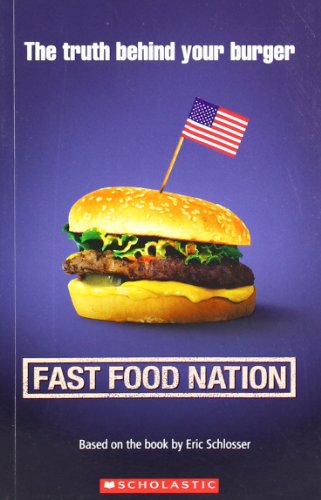All Nonfiction
- Bullying
- Books
- Academic
- Author Interviews
- Celebrity interviews
- College Articles
- College Essays
- Educator of the Year
- Heroes
- Interviews
- Memoir
- Personal Experience
- Sports
- Travel & Culture
All Opinions
- Bullying
- Current Events / Politics
- Discrimination
- Drugs / Alcohol / Smoking
- Entertainment / Celebrities
- Environment
- Love / Relationships
- Movies / Music / TV
- Pop Culture / Trends
- School / College
- Social Issues / Civics
- Spirituality / Religion
- Sports / Hobbies
All Hot Topics
- Bullying
- Community Service
- Environment
- Health
- Letters to the Editor
- Pride & Prejudice
- What Matters
- Back
Summer Guide
- Program Links
- Program Reviews
- Back
College Guide
- College Links
- College Reviews
- College Essays
- College Articles
- Back
Fast Food Nation: by Eric Schlosser MAG
Most reports about the fast food industry refer to nothing more than the food. It's terrible for you. It makes people obese. There are fingers in the chili. While the information about the food is important, it's a bit superficial and, well, obvious. But the fast food industry is not just about food; its underlying issues have barely begun to be exposed.
People know about obesity and diabetes, but many don't know of the towns that become impoverished and gang-ridden when the big meat packaging plants move in, or all the people whose livelihoods are ruined in a matter of months because of the risks involved
in opening franchises. Eric Schlosser gives voice to these untold stories in Fast Food Nation, a critique of the negative effects of the fast food industry on every aspect of our society.
As the cover boasts, Fast Food Nation reveals the “dark side of the all-American meal.” The book discusses everything from competing franchises to the giant trusts that threaten to engulf small businesses. Schlosser traces the industry's growth, and along the way he covers many topics, including young, uneducated workers, the laboratory flavors and smells, the immigrant workforce in meat-packing plants, and farmers whose traditional livelihoods are being run out of business – just to name a few.
This is not the usual condemnation of the industry and its fatty foods. Instead, it takes various routes down paths that are more obscure but no less important, and it provides a refreshing argument against the fast food industry.
However, because he covered so many topics, Schlosser's book is hard to follow. Transitions are often abrupt, which makes the book seem disjointed. At times it is confusing trying to figure out how things are supposed to fit together, especially when it takes time to develop a point or claim. A quick glance at the heading and a skipped page or two will get you to the point more easily.
The beginnings of topics are probably not the only places you will want to skip pages. At times, I would shovel my way out of the blanket of heavy statistics, only to be buried a few pages later by a heaping list of anecdotes. Each time an avalanche hit, I was left with less desire to dig myself out. Almost everything is over-exemplified, so the book is probably twice as long as it needs to be.
Schlosser attempted to write a mini-book for every topic he discussed, and it made me less inclined to empathize with the one hundredth person whose life was destroyed by McDonald's. The examples don't make you more interested, because by the end, you will
be desensitized.
This book is not light reading, but it is worthwhile if you are interested in the effects of fast food. Everyone can learn something with the information it provides. For those who have watched the documentary “Super Size Me” or read the related book, Don't Eat This Book: Fast Food and the Supersizing of America, and enjoyed either, you might also like Fast Food Nation. It digs in on many levels that are not commonly known, and in that way, it is worthwhile. But I won't be reading it again.
Similar Articles
JOIN THE DISCUSSION
This article has 1 comment.
